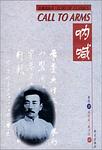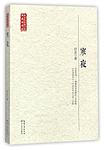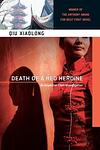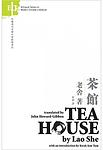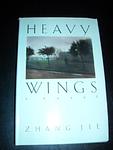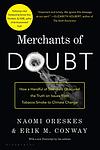The Greatest Bulgarian, Chinese "Fiction" Books Since 1900
Click to learn how this list is calculated.
This list represents a comprehensive and trusted collection of the greatest books. Developed through a specialized algorithm, it brings together 300 'best of' book lists to form a definitive guide to the world's most acclaimed books. For those interested in how these books are chosen, additional details can be found on the rankings page.
Genres
Countries
Date Range
Reading Statistics
Click the button below to see how many of these books you've read!
Download
If you're interested in downloading this list as a CSV file for use in a spreadsheet application, you can easily do so by clicking the button below. Please note that to ensure a manageable file size and faster download, the CSV will include details for only the first 500 books.
Download-
1. Call to Arms by Xun Lu
"Call to Arms" is a collection of short stories that vividly capture the impact of the socio-political upheaval during the early 20th century in China. The narratives delve into the lives of ordinary people, predominantly the peasantry and the lower classes, who are often caught in the throes of societal change and struggle for survival. Through a blend of realism and symbolism, the stories explore themes of tradition versus modernity, the human condition, and the quest for justice, reflecting the author's critical engagement with the national and cultural issues of his time.
-
2. Auto Da Fé by Elias Canetti
"Auto Da Fé" is a story about Peter Kien, a renowned sinologist who is obsessed with his library of books. His life takes a turn when he marries his illiterate housekeeper, Therese, who is only interested in his wealth. After a series of mishaps, Kien is tricked out of his home and ends up living on the streets. The novel explores themes of obsession, intellectualism, and the destructive power of the mind.
-
3. Rickshaw Boy by Lao She
"Rickshaw Boy" is a novel about a young man living in Beijing in the 1920s who struggles to escape poverty and achieve personal independence. Despite his hard work and determination, he is continuously set back by societal and personal misfortunes, including failed business ventures, a disastrous marriage, and the loss of his rickshaw. The book serves as a critique of traditional Chinese society, illustrating the harsh realities of life for the working class during this time period.
-
4. Waiting by Ha Jin
"Waiting" is a story set in China during the Cultural Revolution and its aftermath, revolving around the life of Lin Kong, a military doctor who is torn between his love for two women. He is stuck in an arranged marriage with his traditional wife in the countryside, while he falls in love with a modern, city nurse. The novel explores his 18-year struggle to divorce his wife and marry his lover, depicting the clash between traditional and modern Chinese culture, personal desires, and societal expectations.
-
5. A Ballad for Georg Henig by Viktor Paskov
"A Ballad for Georg Henig" is a narrative that explores the life of a Jewish craftsman and violin maker, Georg Henig, in the 18th century. The story is set in Bulgaria and delves into the historical events and cultural dynamics of the time, including the Ottoman rule and the social status of Jews. The protagonist's life is filled with love, loss, and the quest for artistic perfection, all against the backdrop of a society marked by religious and ethnic tensions.
-
6. Balzac and the Little Chinese Seamstress by Dai Sijie
This novel tells the story of two teenage boys sent to a remote mountain village for re-education during China's Cultural Revolution. There, they meet a local tailor's daughter, who becomes their friend and the object of their shared affection. The boys discover a hidden suitcase filled with forbidden Western classics in Chinese translation, and their lives are forever changed. The books not only awaken their passion for literature, but also allow them to educate the Seamstress, ultimately leading to a heartbreaking love triangle and a tale of personal freedom against the odds.
-
7. The Three-Body Problem by Cixin Liu
The book is a science fiction novel that intertwines the cultural revolution of China with a complex narrative involving astrophysics, virtual reality, and alien contact. It follows a disillusioned scientist who, after suffering personal tragedy during the Cultural Revolution, sends a message into space, only to receive a response from an alien civilization on the brink of destruction. As the aliens plan their migration to Earth, a secret organization works to facilitate the invasion, while a disparate group of scientists and military personnel attempt to understand and prevent the impending extraterrestrial crisis. The novel grapples with themes of human nature, technological advancement, and the vast, often incomprehensible universe.
-
8. Cold Nights by Ba Jin
"Cold Nights" is a poignant love story set in the backdrop of China's turbulent political climate during the 1940s. The narrative follows the protagonist, Wan Da, as he navigates through the hardships of life, love, illness, and death. As his wife, Zhenzhen, falls ill with tuberculosis, Wan Da's struggle to secure medical help for her amidst the chaos of war paints a vivid picture of human endurance and the power of love. The book also explores themes of existentialism and the human condition, offering a profound look at life's hardships and the strength of the human spirit.
-
9. Natural Novel by Georgi Gospodinov
"Natural Novel" is a thought-provoking and imaginative work that seamlessly weaves together various narratives and perspectives. The book explores the concept of storytelling and its power to shape our understanding of reality. Through a blend of fiction, memoir, and philosophical musings, the author delves into the complexities of human existence, the interconnectedness of life, and the search for meaning in a world filled with both beauty and tragedy. With its poetic prose and profound insights, "Natural Novel" invites readers to contemplate the boundaries between truth and fiction, ultimately challenging conventional notions of storytelling.
-
10. Death Of A Red Heroine by Qiu Xiaolong
"Death Of A Red Heroine" is a crime novel set in 1990s Shanghai, China. The story follows Inspector Chen Cao as he investigates the murder of a young woman, whose body is found in a canal. As Chen delves deeper into the case, he uncovers a web of corruption, political intrigue, and personal secrets that challenge his loyalty to the Communist Party and force him to confront the complexities of modern Chinese society. Through vivid descriptions of Shanghai's changing landscape and insightful commentary on social issues, the novel offers a captivating portrayal of a country in transition.
-
11. Teahouse by Lao She
"Teahouse" is a historical drama that explores 50 years of Chinese history (1898-1948) through the microcosm of a Beijing teahouse. The narrative follows the lives of the teahouse owner and his customers, reflecting the social changes, political turmoil, and cultural shifts of the time. The story provides a deep insight into the Chinese society, its traditions, and the impact of Western influence. It also highlights the struggle of the common people amidst corruption, oppression, and the collapse of traditional values.
-
12. A Hero Born by Jin Yong
"A Hero Born" is the first installment in an epic martial arts saga set in the Song Dynasty of China, where the story follows the life of Guo Jing, a young boy from a humble background. After his father, a loyal Song patriot, is murdered, Guo Jing is raised by Genghis Khan in the Mongolian steppes. Throughout his adventures, he encounters a diverse cast of characters, learns from legendary martial arts masters, and is imbued with the values of honor, loyalty, and the complex moralities of warfare and brotherhood. His destiny is intertwined with the fate of his nation as he embarks on a quest to become a true hero and to confront formidable enemies that threaten the very fabric of the martial arts world.
-
13. Heavy Wings by Zhang Jie
"Heavy Wings" is a novel that explores the societal changes in China during the late 20th century. It follows the story of a group of innovative engineers striving to design and build China's first large-scale commercial aircraft. Despite facing numerous challenges such as lack of resources, political interference, and personal struggles, they remain committed to their mission, symbolizing the spirit of perseverance and innovation. The story is a reflection of China's journey towards modernization and technological advancement.
-
14. Half of Man is Woman by Zhang Xianliang
This novel provides a deeply personal account of the author's experiences during China's Cultural Revolution and his subsequent imprisonment in a labor camp. The protagonist struggles with the harsh realities of his imprisonment, including starvation and physical abuse, while also grappling with his own identity and the societal expectations of masculinity. His release and subsequent marriage only further complicate his quest for self-understanding, as he navigates the challenges of reintegrating into society and maintaining a relationship with a woman who has her own traumatic past.
-
15. Time Of Parting by Anton Donchev
The novel is a historical drama set in the 17th century in the Rhodope Mountains, exploring the cultural and religious conflict between the Christian Bulgarians and the Ottoman Empire. It follows the story of a Bulgarian village facing the threat of Islamization, as the Ottoman authorities impose a conversion campaign. The narrative delves into the choices and struggles of the villagers, particularly the character of the village leader, who must navigate between resistance and survival. The book examines themes of identity, faith, and the complexities of coexistence during a time of oppressive rule and societal upheaval.
-
16. Tobacco by Dimitar Dimov
The book in question is a historical novel set in the early 20th century, exploring the lives of characters involved in the tobacco industry in Bulgaria. It delves into the personal and political turmoil of the time, focusing on the struggles of the working class and the manipulations of the wealthy elite. The narrative intertwines love, betrayal, and ambition, as it portrays the harsh realities of labor exploitation and the social upheavals leading up to World War II. Through its vivid characters and rich descriptions, the novel offers a critical look at the impact of capitalism and the quest for power on individuals and society.
-
17. The Iron Candlestick by Dimitar Talev
The book is a historical novel set in the early 20th century, focusing on the struggles of the Bulgarian people under Ottoman rule. It follows the life of a young Bulgarian boy from his childhood to his involvement in the national liberation movement. The narrative weaves personal and political threads, depicting the boy's growth amidst the backdrop of cultural oppression, resistance, and the quest for national identity. The story is a poignant exploration of the human spirit and the fight for freedom, showcasing the resilience of a community striving to preserve its heritage and autonomy against the odds.
-
18. Osadeni Dushi by Dimitar Dimov
The novel is a poignant exploration of the human condition, set against the backdrop of a tuberculosis sanatorium in the mountains of pre-World War II Spain. It delves into the lives of the patients and staff within the sanatorium, weaving a complex tapestry of love, betrayal, and philosophical introspection. The narrative focuses on the intense and tragic love affair between a disenchanted monk and a passionate, free-spirited woman, both seeking meaning and redemption amidst the despair of their illness. Through their story, the novel examines themes of morality, existential anguish, and the struggle for spiritual and emotional liberation.
-
19. Cat Country by Lao She
This novel is a satirical science fiction tale that transports the reader to Mars, where the protagonist, a Chinese man, finds himself stranded in a society inhabited by cat-like humanoids. The narrative delves into the peculiarities and dysfunctions of this Martian civilization, known as Cat Country, highlighting its inhabitants' indolence, corruption, and societal decay. Through the lens of this alien society, the author critiques various aspects of early 20th-century Chinese society, politics, and culture, using the allegorical Cat Country to reflect on human follies, the dangers of political apathy, and the consequences of societal neglect. The story is both a unique exploration of extraterrestrial life and a poignant commentary on the human condition.
-
20. The Bells Of Prespa by Dimitar Talev
The novel is a historical saga set in the early 20th century, focusing on the lives and struggles of the Macedonian people under Ottoman rule. It weaves a rich tapestry of characters, both fictional and real, as they navigate the complexities of national identity, cultural heritage, and political upheaval. The narrative delves into the personal and collective challenges faced by the inhabitants of the Prespa region, highlighting their resilience and the impact of historical events on their daily lives. Through the symbolic resonance of the bells, the story captures the essence of a community's enduring spirit amidst the tides of change and the quest for freedom and self-determination.
-
21. Антихрист by Emilian Stanev
The book in question is a historical novel that delves into the turbulent times of the Second Bulgarian Empire, focusing on the life of a fictional anti-hero who embodies the contradictions and struggles of his era. Set against the backdrop of political upheaval and religious conflict, the protagonist's journey is marked by his quest for power and his complex relationship with morality, faith, and his own identity. As he navigates a world rife with betrayal and intrigue, the novel explores themes of ambition, human nature, and the societal forces that shape individuals during times of crisis.
-
22. Дъщерята на Калояна by Fani Popova
The book is a historical novel set in the 13th century, revolving around the life of a fictional daughter of the real Bulgarian Tsar Kaloyan. It weaves a tale of intrigue, power, and personal growth, as the protagonist navigates the complexities of court life, political alliances, and familial duties. Amidst the backdrop of medieval Bulgaria, the story explores themes of love, betrayal, and the struggle for influence in a time where women's roles were often limited by societal expectations. The protagonist's journey is one of self-discovery and resilience, as she seeks to assert her place in a world dominated by men and to honor the legacy of her father.
-
23. Нощем с белите коне by Pavel Vezhinov
The book is a poignant exploration of human emotions and the complexities of life during a difficult historical period. It follows the journey of a man who, amidst the turmoil of war, finds solace and a sense of purpose in caring for a group of white horses. These majestic creatures become a symbol of purity and hope in a world overshadowed by conflict and despair. As the protagonist navigates the challenges of survival and the moral dilemmas posed by the war, the narrative delves into themes of love, sacrifice, and the enduring strength of the human spirit.
-
24. Ян Бибиян by Elin Pelin
The book is a whimsical children's tale about a mischievous young boy with a heart of gold who embarks on a series of fantastical adventures. Known for his playful antics and boundless imagination, the protagonist navigates a world where he interacts with both humans and magical creatures. His journey is filled with humor and moral lessons, as he often finds himself in trouble but also discovers the importance of friendship, bravery, and kindness. Through his escapades, the boy becomes a beloved figure to readers, embodying the spirit of childhood wonder and the joy of living in a world where anything is possible.
-
25. Ilinden by Dimitar Talev
The novel is a historical narrative set in the early 20th century, focusing on the struggles of the Macedonian people under Ottoman rule. It vividly portrays the events leading up to the Ilinden Uprising, a pivotal moment in the fight for Macedonian independence. Through the lives of its characters, the book explores themes of national identity, resistance, and the human cost of revolution. The narrative weaves personal stories with the broader socio-political context, offering a poignant look at the aspirations and sacrifices of a people yearning for freedom.
Reading Statistics
Click the button below to see how many of these books you've read!
Download
If you're interested in downloading this list as a CSV file for use in a spreadsheet application, you can easily do so by clicking the button below. Please note that to ensure a manageable file size and faster download, the CSV will include details for only the first 500 books.
Download